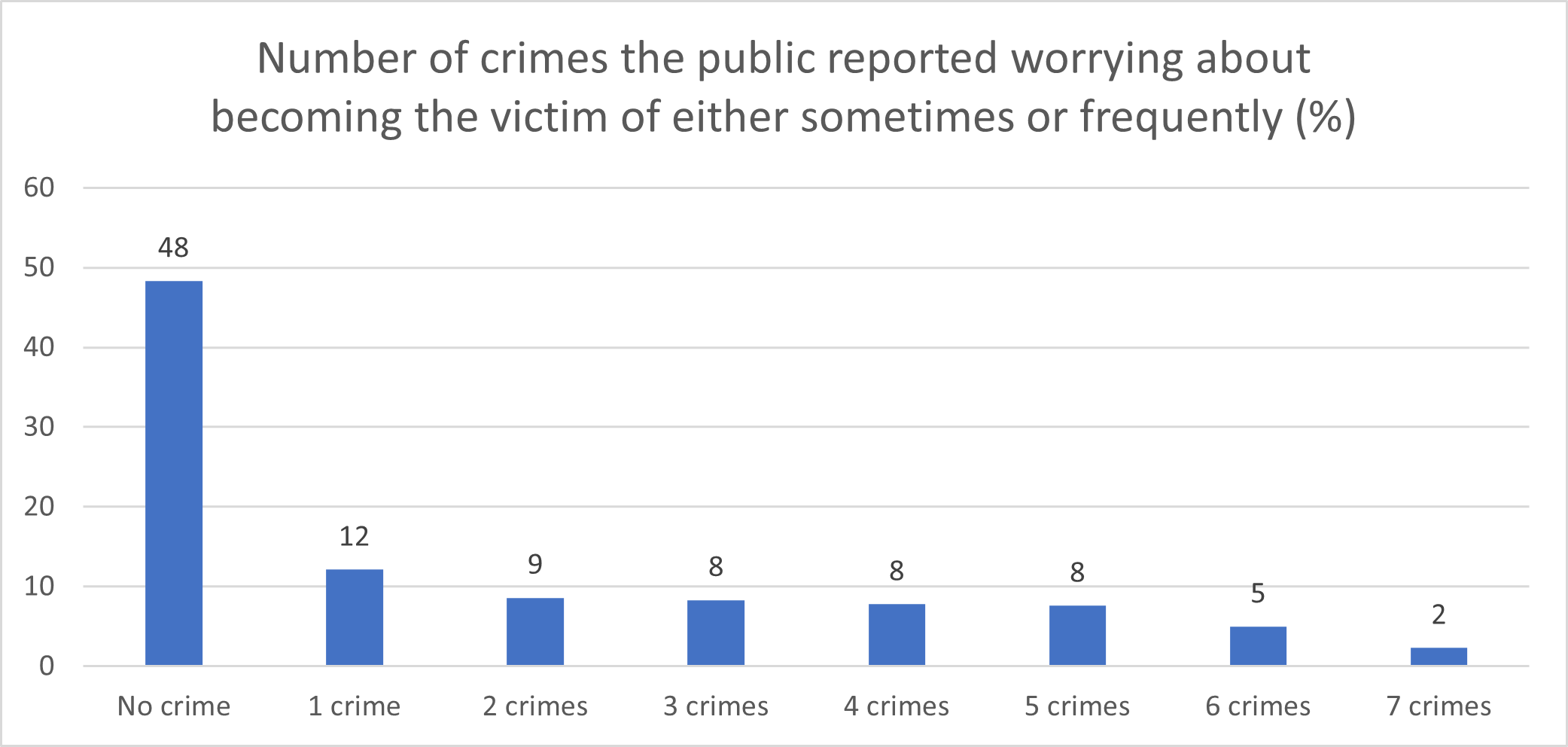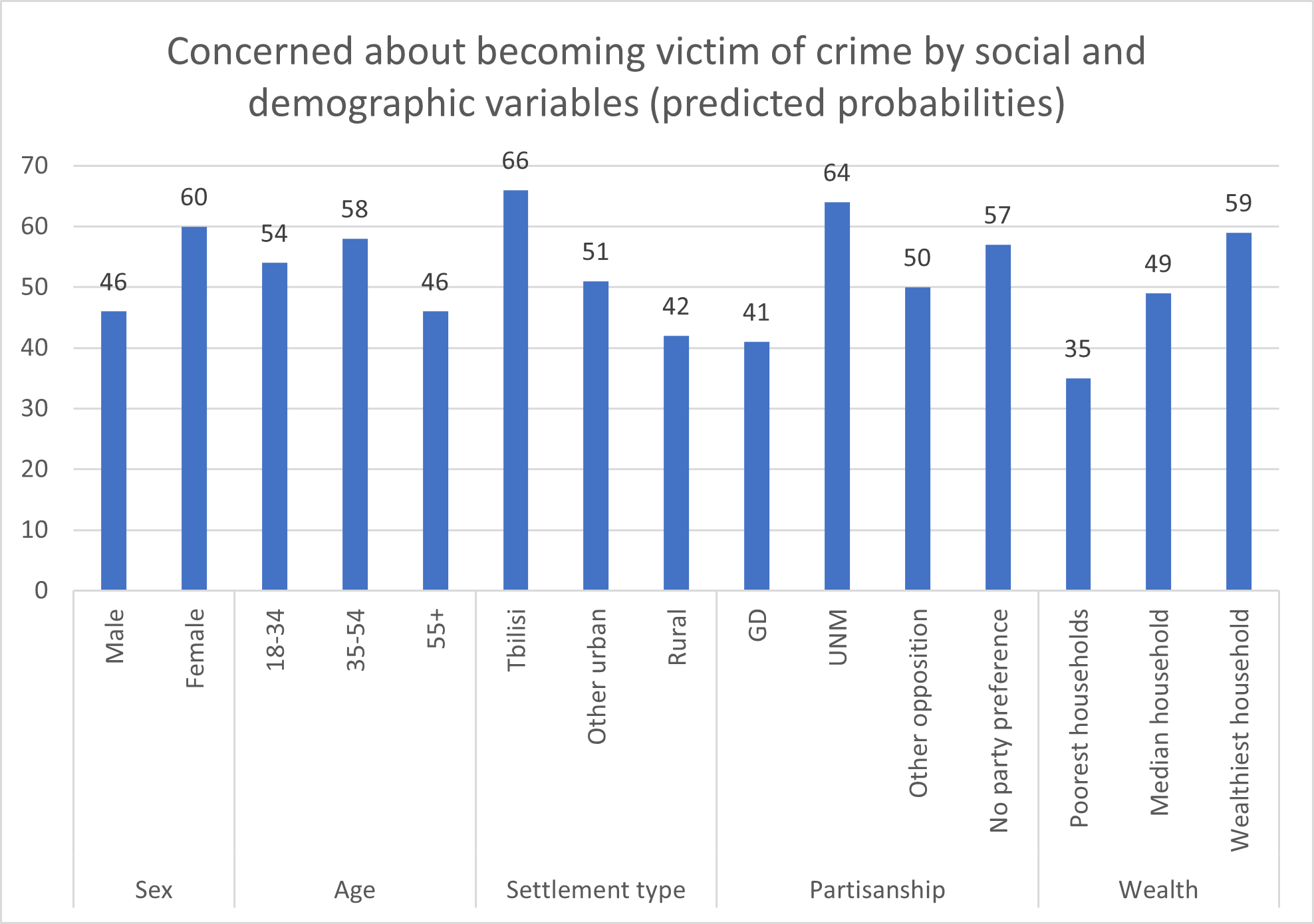
A recent survey has found that a slight majority of Georgians are afraid of being victims of crimes, with women, those living in the capital, and supporters of the country’s main opposition party particularly likely to feel concerned.
In recent years, a number of high-profile crimes have captured the public imagination in Georgia. Whether the Khorava street murders in 2017, the murder of Giorgi Shakarashvili in 2021, or a series of femicides at the end of last year, crime has been a regular part of public discourse.
But how concerned are people about becoming a victim of crime in Georgia?
To understand this issue, CRRC Georgia and NDI asked about people’s fears of becoming a victim of seven different crimes in a December 2022 survey.
The data show that while a slight majority (52%) of people are afraid of falling victim to at least one form of crime asked about on the survey, there is no crime which a majority of people are concerned will affect them.
Among crimes relevant to all respondents, being burgled, mugged, or physically assaulted topped the list of crimes people were worried about, with roughly a third of the public at least sometimes concerned with becoming the victim of one of these crimes. This was followed by concerns about having personal information stolen and being sexually assaulted.
The survey also asked about two crimes which were only relevant to specific groups in the population — car owners and parents. Among relevant respondents, concerns about these crimes were more common than concerns about the other crimes asked about.
Among the 29% of respondents who had children, 37% reported worrying about their child being physically harmed at school at least some of the time. The same share of car owners, 55% of respondents, reported being worried at least sometimes about someone breaking into or stealing their car.

Overall, 12% of the public is concerned with becoming victim to one of the crimes discussed in the survey, while only 2% are concerned with becoming a victim to all seven crimes mentioned.

For reference, survey responses of don’t know, refuse to answer, and never worry were classed as not being concerned about a crime. Respondents who reported that they worried sometimes or frequently about becoming the victim of a crime were classed as being concerned.
Concern over becoming the victim of crime varies significantly among different groups in society.
Women are 14 percentage points more likely than men to be concerned they will become the victims of crime, after controlling for other factors.
People aged 55+ are 12 points less likely to be concerned about becoming the victims of one of the crimes than people aged 35-54, and 8 points less likely than people aged 18-34, all else being equal.
Those in Tbilisi are 15 points more likely to be concerned about becoming the victim of a crime than people in other urban areas, and 24 points more likely than people in rural areas, controlling for other factors.
While roughly a third of people (35%) living in the poorest households in the country are concerned about becoming a victim of one of the above crimes, 59% of those in relatively well-off households are.
Notably, supporters of the ruling Georgian Dream party are least concerned about becoming the victims of crime, while supporters of Georgia’s largest opposition party, the United National Movement, are most concerned about becoming the victims of crime. There is a 23 point gap between supporters of the parties, controlling for other factors.
Supporters of other parties and those who have no apparent political preference fall in between these extremes.
The data show no significant differences between employed people and those not working, ethnic minorities and ethnic Georgians, and people with different levels of education, after accounting for the above noted variables.

Given the number of high-profile incidents of crime in Georgia in recent years, it is perhaps unsurprising that roughly half the public is concerned about becoming the victim of at least one of the crimes asked about in the survey.
This article was written by Dustin Gilbreath, a non-resident Senior Fellow at CRRC Georgia. The views presented in the article are the author’s alone, and do not necessarily reflect the views of CRRC Georgia, NDI, or any related entity.
The data used in this article is available here.








